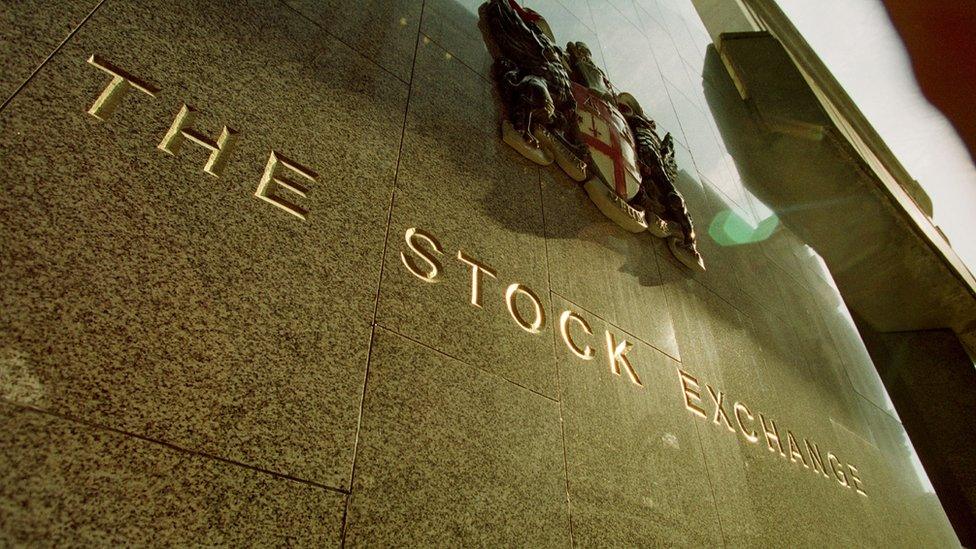Hard or soft? Why the City isn't headed for Norway
- Published

Hard; soft; open; closed. To the City of London it may not make too much difference. While the UK government is still grappling with the outcome of last week's election, Brexit is already getting real for the banks, fund managers and insurers that do business in the Square Mile.
The most immediate example of this is announcement on Tuesday on the process known as clearing. The European Commission has said it wants to heighten its oversight of the clearing of euro-denominated derivatives outside the European Union. What, exactly, does that mean?
A derivative is a financial contract whose value is dependent on an underlying asset, like a commodity, currency or other security. They derive their value from the underlying asset, hence the name. For example, a very common derivative is known as an "interest rate swap". That's a derivative that allows a company worried about rising interest rates to swap their variable payments for a fixed regular amounts, say. London's LCH clears about 90% of the interest rate swap market.
The clearing houses stand between two parties in a derivatives transaction - and try to make sure everyone gets what they are owed. So they track various parties' exposures to the market, they manage and reduce risk and, most importantly, they collect money from participants - known as margin - to help settle and unwind positions in case anyone defaults.
The clearing houses are important parts of the financial infrastructure. Ensuring that more derivatives transactions were cleared was a crucial part of the regulatory response to the 2008 financial crisis.
But it has long been an irritation to some in Brussels that so much euro-denominated derivatives business is cleared in London, mainly at LCH, which is owned by the London Stock Exchange Group. Brexit simply breathed new life into this old grievance.

Valdis Dombrovskis, the European Commissioner responsible for financial services
Still, for those fearing an all-out land grab of London's business, there was some good news. Tuesday's proposal stopped short of the nuclear option that would have immediately forced chunks of London's clearing business to be relocated to within the EU.
Instead, the Commission proposed a beefed up form of supervision of clearers outside the EU that are deemed "systemically important" - basically the biggest clearing houses.
That doesn't look terribly controversial. The London Stock Exchange has said it would be happy to be more directly regulated by European supervisors. It is an approach taken by the American authorities, with 90 per cent of dollar-denominated interest-rate swaps cleared outside the US.
But there was a sting in the tail. The European proposal kept open the stick of forced relocation, a move that critics say would mean higher costs for users and a less liquid, riskier market. Effectively, it said that for the very largest clearing houses enhanced regulation might not be sufficient and the Commission could require that they move into the EU.
One comfort may be that it falls to European regulators and the relevant central bank, rather than politicians, to determine that other measures have failed in overseeing clearing houses. The Commission said Tuesday it was "not moving business for the sake of moving business". But others are wary that once a legislative tool is created giving Europe the power to force relocation, it will - sooner or later - be used.

The London Stock Exchange Group owns LCH, London's biggest clearing house
Elsewhere, though, the City's planning for Brexit is running ahead of the political debate. Banks must by mid-July share their contingency plans with the Bank of England. Those could include what jobs and activities must move to the continent under a range of different scenarios.
So far, the emphasis has been on being ready for a worst case scenario, according to people familiar with the banks' planning. That is an exit from the EU where banks lose their "passporting" rights to operate freely, where there is no access granted on the basis of "equivalence" of regulations and where there are no transition arrangements in place to act as a crash mat for the UK's financial sector.
So are banks likely to hit the pause button now that the election result has thrown into doubt the government's strategy for a "hard" Brexit?
Well, probably not. Financial analysts generally agree that the hung parliament makes a different type of Brexit more likely. But many also argue that it heightens the small risk that we get jettisoned out of the Union without any deal at all, either by design, delay or just by dint of sheer incompetence.
More importantly, it isn't clear that the options being discussed for a "soft" Brexit would work for the City well either. Staying in the customs union would mean tariff-free, frictionless trade of goods but doesn't cover the type of cross-border provision of services the City provides.
The "Norway option" - staying within the European Economic Area - would mean banks based in London would keep passporting, a major advantage. But that too presents problems in the long term, say people involved with the industry's work on the subject.
Being within the EEA but not within the EU means being a so-called "rule-taker" - signing up to the rules and regulations of the EU without having any say in making them. That is enough to make the industry twitchy. It could also mean financial regulation being made without the input and expertise of the largest financial centre in Europe.
Hence the City's insistence that the industry will ultimately need a bespoke arrangement with Europe - one that grants access to each other's markets; one that sets out ways for keeping regulation aligned (though not requiring it be identical); and one that has a method for resolving disagreements as they inevitably arise.
That may be needed no matter how hard, soft, tough, easy or otherwise the UK's Brexit proves.